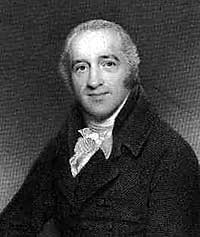The following is a poem from George Herbert (1593-1633), an Anglican priest and poet. On his ordination, Herbert went to Bemerton, a rural parish 75 miles southwest of London where he preached and wrote poetry. The son of a wealthy Welsh family, he helped to rebuild the church out of his own funds. Herbert died of tuberculosis three years after being ordained to the priesthood, leaving behind a treasure of poetry.
The Kingdom of heaven is like unto a merchant man, seeking goodly pearls; who, when he had found one, sold all that he had and bought it.—Matthew 13.45
I know the ways of Learning; both the head
And pipes that feed the press, and make it run;
What reason hath from nature borrowed,
Or of itself, like a good huswife, spun
In laws and policy; what the stars conspire,
What willing nature speaks, what forced by fire;
Both th' old discoveries, and the new-found seas,
The stock and surplus, cause and history:
All these stand open, or I have the keys:
Yet I love thee.
I know the ways of Honour, what maintains
The quick returns of courtesy and wit:
In vies of favours whether party gains,
When glory swells the heart, and moldeth it
To all expressions both of hand and eye,
Which on the world a true-love-knot may tie,
And bear the bundle, wheresoe'er it goes:
How many drams of spirit there must be
To sell my life unto my friends or foes:
Yet I love thee.
I know the ways of Pleasure, the sweet strains,
The lullings and the relishes of it;
The propositions of hot blood and brains;
What mirth and music mean; what love and wit
Have done these twenty hundred years, and more:
I know the projects of unbridled store:
My stuff is flesh, not brass; my senses live,
And grumble oft, that they have more in me
Than he that curbs them, being but one to five:
Yet I love thee.
I know all these, and have them in my hand:
Therefore not sealed, but with open eyes
I fly to thee, and fully understand
Both the main sale, and the commodities;
And at what rate and price I have thy love;
With all the circumstances that may move:
Yet through these labyrinths, not my grovelling wit,
But thy silk twist let down from heav'n to me,
Did both conduct and teach me, how by it
To climb to thee.
Labels: George Herbert, poetry


 Look at the fig tree and all the trees; as soon as they sprout leaves you can see for yourselves and know that summer is already near. So also, when you see these things taking place, you know that the kingdom of God is near. Truly I tell you, this generation will not pass away until all things have taken place. Heaven and earth will pass away, but my words will not pass away.
Look at the fig tree and all the trees; as soon as they sprout leaves you can see for yourselves and know that summer is already near. So also, when you see these things taking place, you know that the kingdom of God is near. Truly I tell you, this generation will not pass away until all things have taken place. Heaven and earth will pass away, but my words will not pass away. In Jeremiah, we get a short and pithy message: “God keeps his promises.” Nobody has to wonder about that. Jeremiah had to tell his wealthy friends and others that things weren’t right between them and God. But he also got to say that God was going to do something about that, even if they weren’t. He was going to re-establish righteousness, a right relationship between God and God’s people. In this brief passage one has the feeling it’s a done deal, so you might as well enjoy the show! The passage also proclaims God’s intention of justice and righteousness in the land—a hope that has sustained faithful people through many faithless times, and continues to do so. God redeems messes.
In Jeremiah, we get a short and pithy message: “God keeps his promises.” Nobody has to wonder about that. Jeremiah had to tell his wealthy friends and others that things weren’t right between them and God. But he also got to say that God was going to do something about that, even if they weren’t. He was going to re-establish righteousness, a right relationship between God and God’s people. In this brief passage one has the feeling it’s a done deal, so you might as well enjoy the show! The passage also proclaims God’s intention of justice and righteousness in the land—a hope that has sustained faithful people through many faithless times, and continues to do so. God redeems messes.


































 He read of the sacrifices in the Old Testament, and later wrote that he thought, "What, may I transfer all my guilt to another? Has God provided an offering for me, that I may lie my sins on his head?" He said that on realizing that he had sinned and needed the forgiveness offered through Jesus, he immediately laid his sins "upon the sacred head of Jesus."
He read of the sacrifices in the Old Testament, and later wrote that he thought, "What, may I transfer all my guilt to another? Has God provided an offering for me, that I may lie my sins on his head?" He said that on realizing that he had sinned and needed the forgiveness offered through Jesus, he immediately laid his sins "upon the sacred head of Jesus." I am working on finishing up a project with 365 daily readings for folks in grief. This does not necessarily mean people going through the loss of a loved one, but can include loss of ability due to illness, grief after a divorce, or any time one is healing after a loss.
I am working on finishing up a project with 365 daily readings for folks in grief. This does not necessarily mean people going through the loss of a loved one, but can include loss of ability due to illness, grief after a divorce, or any time one is healing after a loss.
 But perhaps namelessness is appropriate for this living parable. And maybe it is best, too, that we don’t find out how her story ends. The nameless woman whose ultimate fate we never know is perhaps an even better icon of trust, for her story was a precarious one. She went to the temple that day not knowing if she would ever have two little coins to call her own again. It could have been her path to a life of begging or even a station on the road to starvation.
But perhaps namelessness is appropriate for this living parable. And maybe it is best, too, that we don’t find out how her story ends. The nameless woman whose ultimate fate we never know is perhaps an even better icon of trust, for her story was a precarious one. She went to the temple that day not knowing if she would ever have two little coins to call her own again. It could have been her path to a life of begging or even a station on the road to starvation. 














0 Comments:
Post a Comment
<< Home